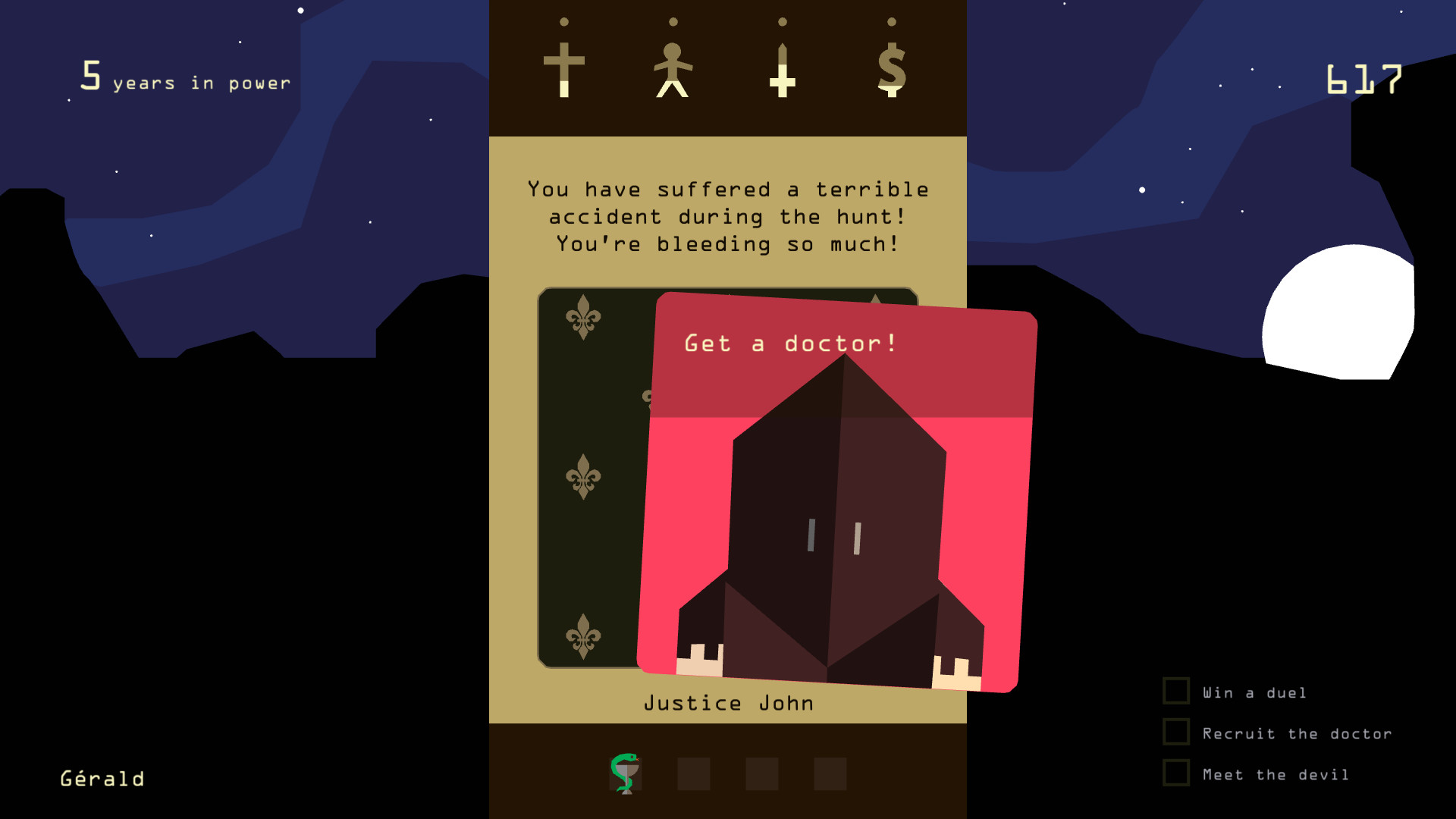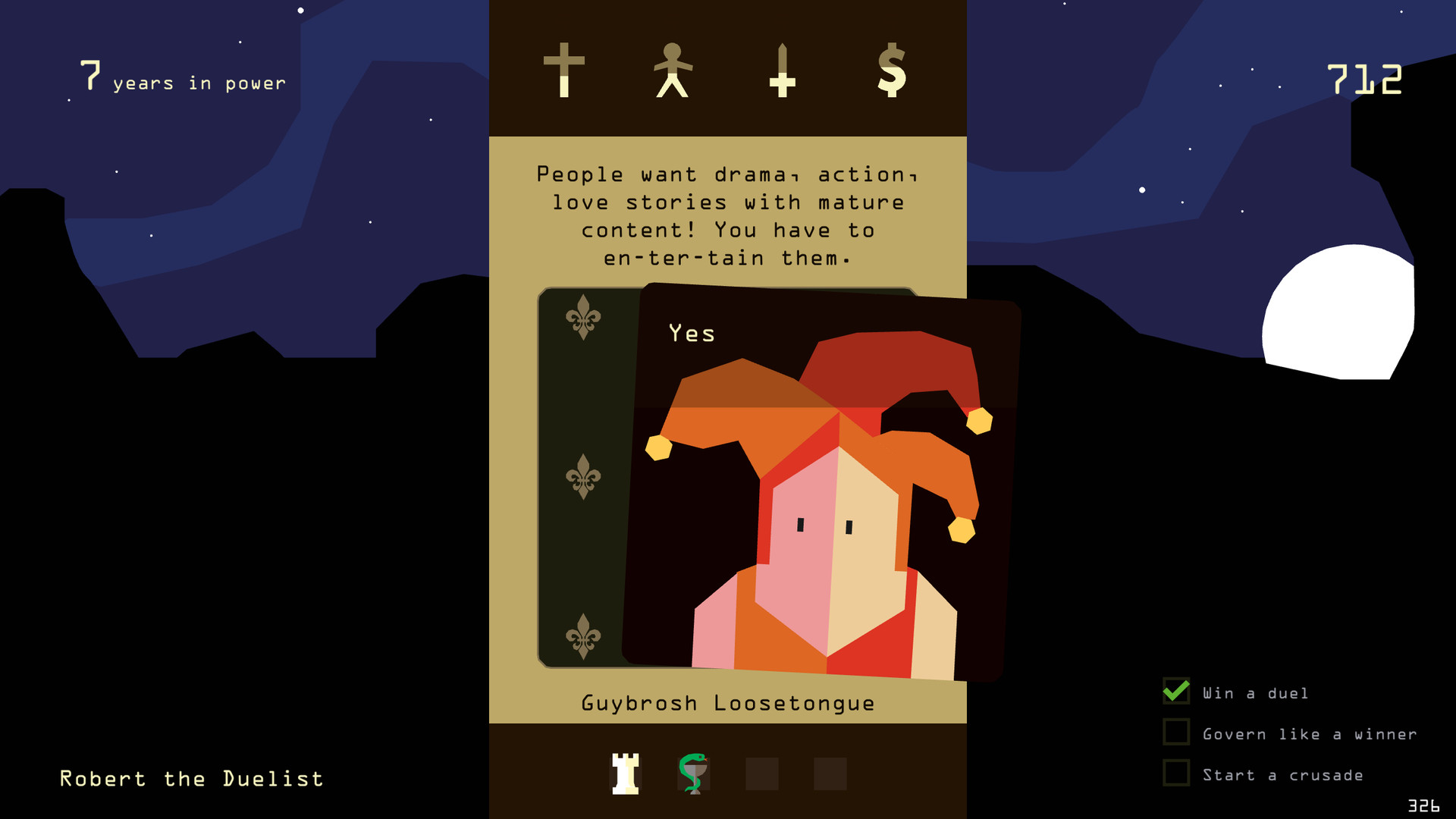Reigns invites you to be a king of inconsequential actions
If the 2016 US presidential election has shown us anything, it’s that politics is almost by design ruthless and unsavory. Though this is nothing new to most – few sentiments are as near universal across America as a disenfranchisement with the political machine – this election has proven exceptionally messy, sparking across the country a mood that in some ways approximate a mini civil war. There is no compromise, no understanding; only two sides with a widening gap in between. If keeping supporters happy is a difficult task for political leaders, appeasing everyone is utterly off the table. The best that can be hoped for is for this tension to hold, lest it break and plunge our country into even further anarchy. It is into this tumultuous environment that Reigns – a new mobile game from indie developer Nerial – was released back in August. Casting you as a recently crowned king, Reigns presents you with a court of forever discontent peoples, be they peasants or generals or priests. Tasked with fielding their requests, your job, it quickly becomes apparent, is not that of a benevolent ruler but one of self-preservation.

What is so startling about Reigns is how easily it causes you to forfeit any notion of morality. When I first began swiping through the proposals and pleas of my populace (Reigns employs a Tinder-esq, left-right swiping system for approving or rejecting people), I opted for the choices that, in short, made me feel good. I was determined, in my naivety, to be a “good” ruler who cared more for his people than profits and the violent spreading of ideologies. It became fast apparent, however, that Reigns was not designed with altruism behind, but rather envisions a ruthless political balancing act where your own concern should be what keeps you on the throne.
Like our present day political system, it is impossible to survive in Reigns without getting dirty. There are four major pillars of society in Reigns – the citizens, the army, the economy, and the church – and satisfying the often wildly divergent interests of these pillars becomes a literal matter of life or death. The only real “goal” of Reigns is to stay on the throne for as many years as possible, and failing to balance the needs and wants of all of your citizens will inevitably lead to your removal and subsequent death. Neglect the church and godless heathens will overthrow the kingdom. Allow the economy to grow too much and merchants will seize control, pushing you out. Politics in “Reigns” then becomes a game of numbers, each request considered not for its ethical worth but how it will alter the balance of power.
What Reigns lacks is humanity
On the surface, then, Reigns is both an incredibly cynical and comical view of politics. The idea that self-interest fuels every political event is a grim, if easily accepted notion, but at the same time Reigns is not so serious as to ignore the dark comedy of politics gone wrong. “Reigns” aesthetics, for example, feature cartoonish low-poly caricatures of each political figure, and the writing of each card is always presented with a self-aware wit. For example, a general came to me at one point to nonchalantly ask if we “should burn Lamascus and kill all the population,” as casually as if we were discussing what to have for dinner.
As a darkly charming extrapolation of the transparent and invisible politics that govern society, then, Reigns is an undeniable success. There is a gleeful satisfaction to be had in placing yourself within the role of a morally bankrupt ruler, essentially acting as both a chance to show people how you would “do things better,” without requiring you to actually follow that line of thinking past your own self-interests. You are the master of your own destiny and your kingdom subject to your command, right up until your people decide to hold an impromptu execution with your head on the agenda.

What Reigns lacks, however, and what ultimately prevents it from rising above petty amoral entertainment, is humanity. Because Reigns only considers numbers rather than context, your actions are trivialized by being reduced to a weight on an arbitrary scale. In one run I accidentally raised my citizen’s happiness bar too high, which then resulted in an angry mob storming the castle. It didn’t matter if I was leading my kingdom into prosperity of poverty, when the bars got too low or too high the gig was up. The only way to be a good ruler in Reigns it would seem, is to ensure everyone is universally apathetic. Not because the game is implying unhappiness and happiness are equally prone to anarchy – Reigns social commentary is surface level at best – but because there are not people at play in this world. Only cold, exacting numbers.
Final Word
Reigns preeminent problem is in its inability to graft its mechanical systems to its fiction. The context of your actions is so completely divorced from their outcomes as to render the whole affair absurd. Because it is not enough to simply replicate the gears of the political machine without understanding what moves them. Reigns posits a view of politics divorced from context or meaning, where the wants and needs of the public are both all that matters and entirely dismissible. As a satirical political simulation, Reigns is good for a few guilty laughs. But politics is nothing without the people behind the numbers, an understanding “Reigns” fails to grasp leaving it emotionally hollow and decidedly tedious.


